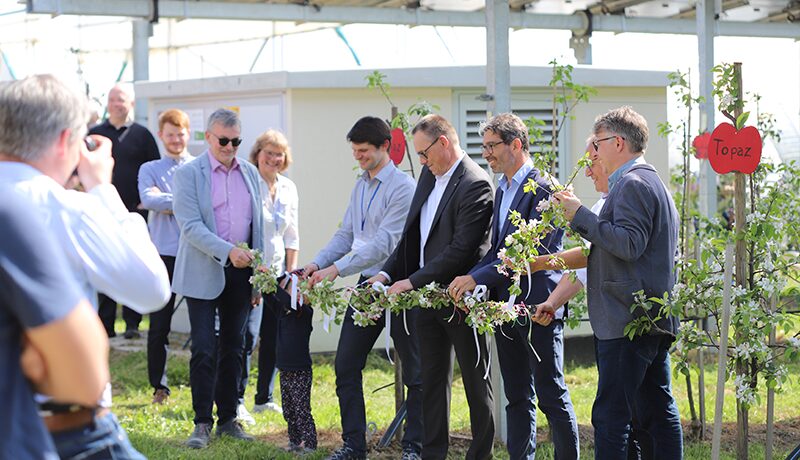Germany’s Largest Agri-PV Orchard Installation Inaugurated
Oberkirch-Nußbach, June 2024 – As part of the research initiative “Model Region Agri-Photovoltaics for Baden-Württemberg,” a consortium of 13 partners led by the Fraunhofer Institute for Solar Energy Systems ISE is building and studying a range of Agri-PV pilot systems across the region. Early findings show that not only do crops benefit from partial shading, but PV modules also achieve higher yields thanks to evaporative cooling provided by the plants — a true synergy.
Today, Dr. Andre Baumann, State Secretary at the Ministry for the Environment, Climate and Energy, inaugurated the project’s fifth pilot system — located at Vollmer Fruit Farm in Oberkirch-Nußbach. The research focus at this site is on the interaction of orchard and berry crops with various PV tracking systems.
“Baden-Württemberg recently hit record numbers in solar expansion. But to make the energy transition a success, we must accelerate open-space PV as well. Land is limited, and Agri-PV gives us a double benefit — food and energy from the same area. That’s why this new Agri-PV orchard, now the largest in Germany, sends an important signal. The model region proves: agriculture and solar energy can work together, not against each other,” said Dr. Andre Baumann during the ceremony.
Less Water, Fewer Chemicals – More Power
At the first pilot site above apple trees in Kressbronn on Lake Constance, two years of measurements already show significant benefits:
-
70% reduction in pesticide use
-
50% less water needed for irrigation
-
20% more solar power produced than expected
The additional power yield is believed to result from a combination of plant-induced cooling and improved airflow — a hypothesis now under further study.
“The PV modules benefit from the crops just as much as the crops benefit from the PV system — when Agri-PV is designed right,” summarized Oliver Hörnle, Project Lead at Fraunhofer ISE.
The Nußbach System: Germany’s Largest Agri-PV in Orchard Farming
The new installation consists of four system types, including:
-
Fixed modules over kiwi, pear, apple, and plum trees
-
A semi-transparent tunnel system for berries
-
A dual-mode solar tracker system — one half adjusted based on plant physiology, the other half based purely on solar optimization
The advanced tracking algorithms, developed by Fraunhofer ISE, will be tested on-site with hardware provided by project partner Intech Clean Energy, beginning mid-2024. Agricultural monitoring is led by the Agricultural Technology Center (LTZ) Augustenberg.
Project Scope and Outlook
The overarching goal is to explore viable models for dual land use in agriculture and energy production.
Nine pilot sites across Baden-Württemberg are being equipped with tailor-made Agri-PV systems, covering a range of fruit and berry crops and diverse installation types.
The project is funded by the State Ministries for Environment, Climate and Energy and for Food, Rural Areas and Consumer Protection, and will run through the end of 2024.




